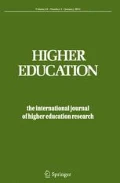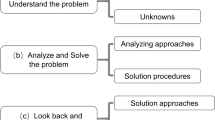Abstract
Problem-based small-group discussions are the cornerstone of health sciences education at the University of Limburg (The Netherlands). In each of three courses, fifteen discussion groups of about eight students were randomly assigned a staff-tutor (control condition) or student-tutor (experimental condition).
In two of the courses no significant differences in cognitive test achievement between the two conditions were found. In one course students tutored by staff-tutors performed significantly better than students tutored by student-tutors. However, no significant differences in test performance were found between students tutored by high-achieving versus average-achieving student-tutors. These findings contradict the “congruence” hypothesis from information processing theory. Several other explanations are explored.
Similar content being viewed by others
References
Clement, D. E. (1971). “Learning and retention in student-led discussion groups,”Journal of Social Psychology, 84: 279–286.
Collier, K. G. (1980). “Peer-group learning in higher education: the development of higher order skills,”Studies in Higher Education 5: 55–62.
Cornwall, M. G. (1979).Students as Teachers: Peer teaching in Higher Education. University of Amsterdam: C.O.W.O.
De Volder, M. L. (1982). “Discussion groups and their tutors: relationships between tutor characteristics and tutor functioning,”Higher Education 11: 269–271.
De Volder, M. L. and Thung, P. J. (1983). “Implementing a problem-based curriculum: a new social health programme at the University of Limburg, the Netherlands,”International Journal of Institutional Management in Higher Education 7: 225–233.
Goldschmid, B. and Goldschmid, M. L. (1976). “Peer teaching in higher education: a review,”Higher Education 5: 9–33.
Lindsay, P. H. and Norman, D. A. (1977).Human Information Processing. (2nd ed.) New York: Academic Press.
Rabe, A. N. (1973). “A comparison of student-led discussion groups to teacher-led discussion groups of teaching college introductory health courses.” Paper presented at the Scientific Forum of the American School Health Association, Chicago, Illinois (E.R.I.C. nr. ED103410-SP009017).
Sarbin, T. R. (1976). “Cross-age tutoring and social identity,” in: V. L. Allen (Ed.),Children as Teachers. New York: Academic Press.
Schmidt, H. G. (1983). “Problem-based learning: rationale and description,”Medical Education 17: 11–16.
Schmidt, H. G. and De Volder, M. L. (Eds.) (1984).Tutorials in Problem-based Learning: A New Direction in Health Professions Education. Assen, The Netherlands: Van Gorcum.
Author information
Authors and Affiliations
Rights and permissions
About this article
Cite this article
De Volder, M.L., De Grave, W.S. & Gijselaers, W. Peer teaching: Academic achievement of teacher-led versus student-led discussion groups. High Educ 14, 643–650 (1985). https://doi.org/10.1007/BF00136502
Issue Date:
DOI: https://doi.org/10.1007/BF00136502




